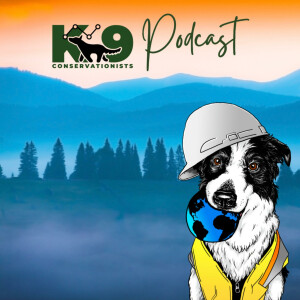
Errors, Mistakes, and Failure in Conservation Dog Training
 2022-02-08
2022-02-08
Download
Right click and do "save link as"
In this episode of K9 Conservationists, Kayla talks about mistakes, failure, and errors.
This week’s science highlight: You Are Not My Handler! Impact of Changing Handlers on Dogs’ Behaviours and Detection Performance.
- Everything is just data; it’s just information
- Now we have all sorts of interesting questions to dig into - was it search conditions? Target odor? Study design? Time of year? Training sample quality? Dog-project fit? Criteria? Splitting? Timing? Stress or exhaustion? Handler interference?
- While applied behavior analysis isn’t always the answer to all training issues, it’s a great place to start.
- Remember the ABCs of applied behavior analysis: antecedent, behavior, consequence. If you’re seeing behavior in your dog that you consider an error, there’s likely an antecedent or a consequence that’s cueing or reinforcing the behavior somehow.
- There are so many ways to frame the concept of failure, errors, mistakes. As much as possible, strive to set your dogs up in training for low-frustration-learning. Rather than teaching my dogs to deal with failure, build up their resilience, enthusiasm, endurance, and problem-solving skills consciously through training.
- When you select ultra-high-drive dogs for a job, frustration is never far away. These dogs are desperate for their reinforcer, and that can be problematic by creating aggressive behaviors towards the target or handler, difficulties in toy play, off-target alerts, and more. Clean training is SO important.
- Of course we can’t completely cut frustration and errors from real life: but our training plans don’t intentionally introduce adversity. Instead they focus on building the dog’s skills so the dog has the tools and the confidence to deal with long, hard, difficult searches.
- In training, sometimes the dog doesn’t find the target. Video is really helpful with this, but the next question is whether or not the dog actually caught the odor at all. In other words, is the problem that the dog completely missed the odor, or that the dog couldn’t source the odor completely?
- Challenging searches often scare people because they’re worried about failure. Blind searches, blank searches, or long searches can make handlers’ palms sweat. That’s ok! Getting used to a search that’s more like an “operational” search is an imperative part of training and field prep. While we never want to demotivate the dog or the handler, embrace challenge in a safe and progressive way.
- Most of these minor mistakes can be addressed through teaching the dog specific cues to help direct them in the field and returning to foundational search skills.
- Safety is always the first concern. Whether it’s a dog investigating a snake, a handler getting lost, or a predator getting too close for comfort, now is not the time to think about training. Act to keep or get you and your dog safe. If you’re really stressed out, angry, afraid, or otherwise really shaken, take a break from surveying or even consider ending the survey early.
You can support the K9 Conservationists Podcast by joining our Patreon at patreon.com/k9conservationists.
K9 Conservationists Website | Merch | Support Our Work | Facebook | Instagram | TikTok
More Episodes
K9 Field First Aid with Kendra Carter
 2024-09-10
2024-09-10
 2024-09-10
2024-09-10
Como Perros Puedan Apoyar a Conservación
 2024-09-03
2024-09-03
 2024-09-03
2024-09-03
Que Son Perros Detectores de Conservación?
 2024-07-23
2024-07-23
 2024-07-23
2024-07-23
Welcome to the Conservation Dog Alliance!
 2024-07-16
2024-07-16
 2024-07-16
2024-07-16
Stimulus Control with Sarah Owings
 2024-06-18
2024-06-18
 2024-06-18
2024-06-18
012345678910111213141516171819
Create your
podcast in
minutes
- Full-featured podcast site
- Unlimited storage and bandwidth
- Comprehensive podcast stats
- Distribute to Apple Podcasts, Spotify, and more
- Make money with your podcast
It is Free
- Privacy Policy
- Cookie Policy
- Terms of Use
- Consent Preferences
- Copyright © 2015-2024 Podbean.com





